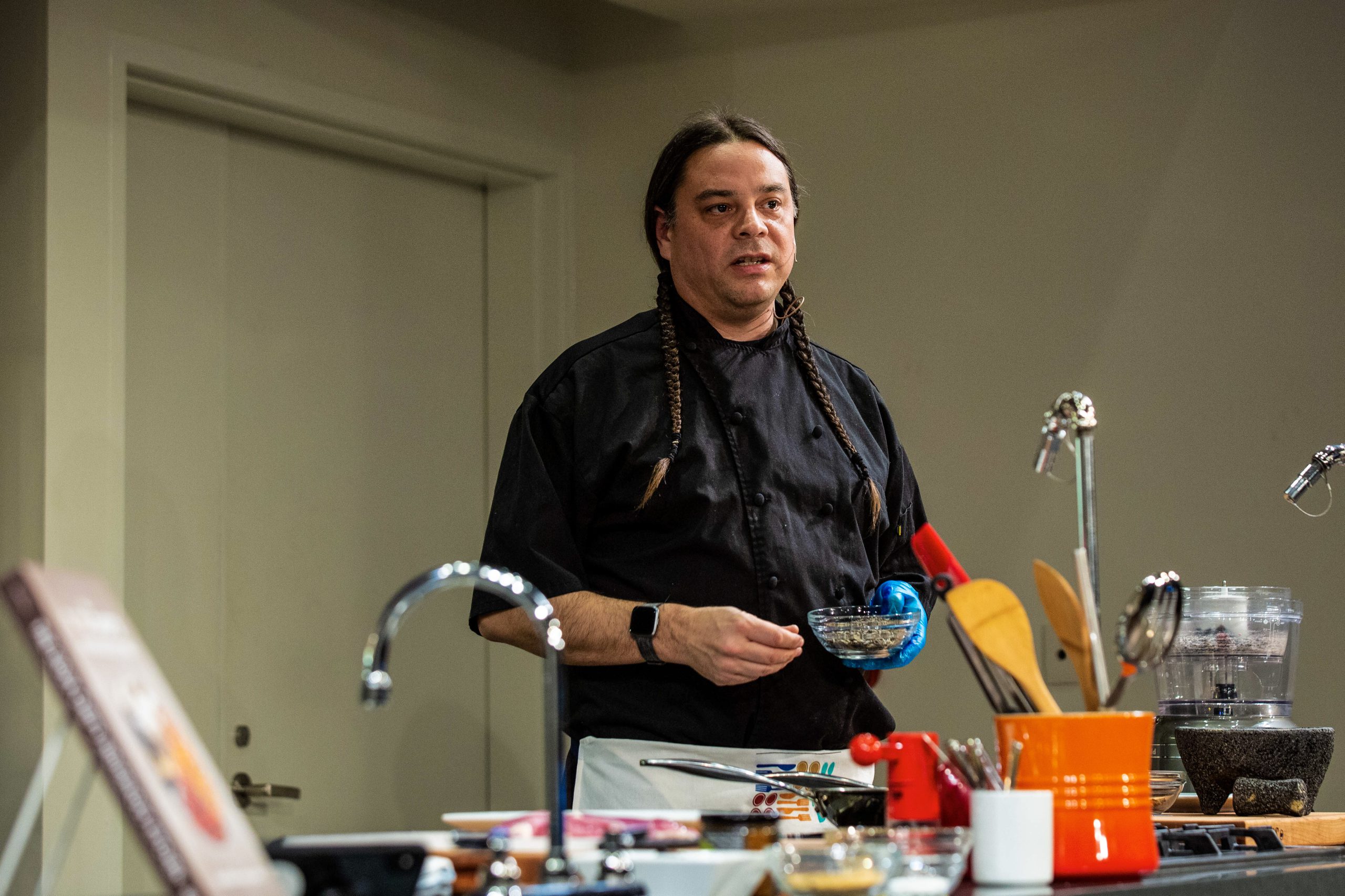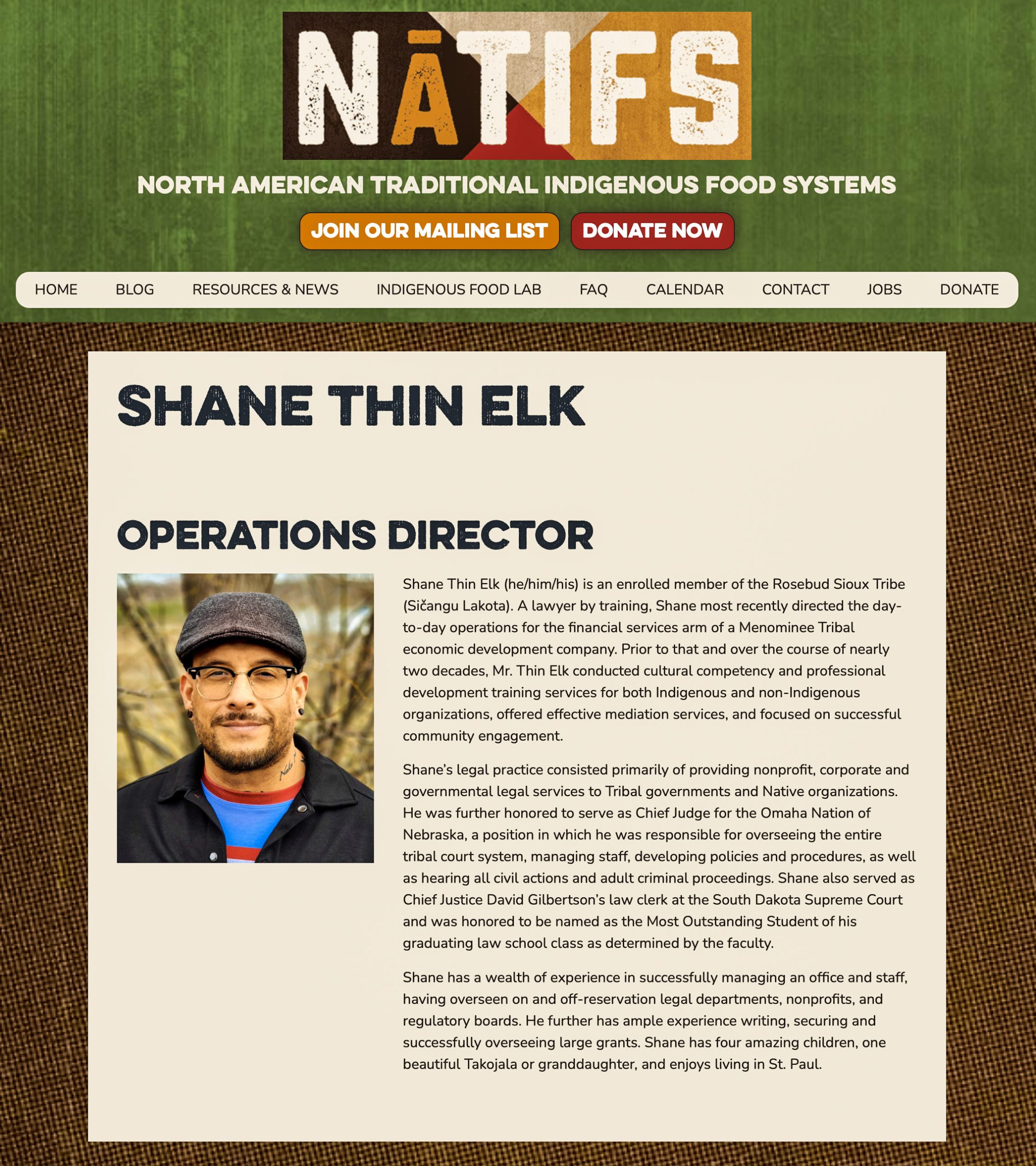Indianz.Com > News > The Sioux Chef under fire for overlooking key employee’s violent past

The Sioux Chef under fire for overlooking key employee’s violent past
Statement from Sean Sherman offers hints of praise for operations director with domestic violence record
Friday, July 22, 2022
Indianz.Com
Indian Country’s most celebrated chef is facing calls for greater accountability after hiring a domestic violence offender for an operation that has generated accolades in the culinary world and praise from prominent political figures.
In a statement on Thursday afternoon, Sean Sherman — famously known as The Sioux Chef — said he hired Shane Thin Elk as his operations director in February. He disclosed that this new employee came on board with a “clean background check” and even offered a glowing review of his team member’s work.
“In the short time we’ve known him, Shane has been an extremely competent leader who believes in our mission and our culture; he has been an asset to our team and we’ve seen no sign of the behaviors described in recent social media posts,” Sherman, who is a citizen of the Oglala Sioux Tribe, said in the statement.
Sherman further acknowledged that he knew of “allegations” about Thin Elk’s past — but indicated he was able to overlook them. In the statement, he described a process in which he said his operation, which includes a growing non-profit and an award-winning restaurant with close ties to the Native community in the Twin Cities of Minnesota, accepted the presence of a domestic violence offender.
“Our staff therapist, who had been meeting with Shane weekly (as she does with all of our leaders), helped advise us and we set up open talking circles with our employees,” Sherman wrote.
“These sessions, led by our therapist, seemed to be productive and — in conjunction with Shane’s clean background check, and no other allegations coming forward — the decision was made to allow Shane to continue,” he continued.
It was only this week that Sherman changed his mind about Thin Elk, a citizen of the Rosebud Sioux Tribe. He said the “allegations” against his employee were “corroborated” by information that apparently did not surface during his operation’s vetting process, which included a “national search” and “multiple interviews,” according to the statement.
“For the well-being of our staff and our community, Shane Thin Elk has resigned effective immediately,” Sherman wrote on Thursday in the statement posted on a social media account for North American Traditional Indigenous Food Systems (NATIFS), his non-profit.
“I want to be clear: the conduct described in the social media posts — conduct now corroborated by documents — is abhorrent and unacceptable; had we been aware of them in February when Shane was hired, it would have played a significant role in our hiring decision,” The Sioux Chef added.
Sherman did not disclose when he first became aware of the “allegations” involving his former employee. But two Native women who spoke to Indianz.Com extensively about the situation said The Sioux Chef’s operation was informed approximately two months ago — by a third Native woman who was alarmed to learn that Thin Elk had become part of the high-profile chef’s inner circle.
The two Native women said it’s well-known in the Twin Cities Native community that Thin Elk was not just part of Sherman’s non-profit but that he was a frequent presence at Owamni, which just won a prestigious James Beard Foundation award for Best New Restaurant last month. Sherman himself was a
semi-finalist and then a finalist for Best Chef in the Midwest region.
“He’s there every day,” one of the Native women said of Think Elk’s visits to Owamni. “He’s there all the time.”
Owmani’s name is drawn from Owámniyomni, the Dakota language term for a sacred place along a portion of the Mississippi River that runs through downtown Minneapolis. The NATIFS non-profit is housed a couple of miles away, at a building called the Midtown Global Market.
Social media posts seen by Indianz.Com show that Thin Elk boasted of his dining experiences at Owamni, which debuted a year ago on July 19, 2021. The restaurant has quickly become such a point of pride that Gov. Tim Walz (D) just declared July 19 as “Owamni Day” in Minnesota.
Lt. Gov Peggy Flanagan (D), a citizen of the White Earth Nation and the highest-ranking Native woman in a state executive position, even showed up to the restaurant on Tuesday to read aloud the proclamation that hails Owamni for “reconnecting people to Indigenous foods to nourish body and spirit.”
Thin Elk’s proximity to Sherman was also apparent in the lead-up to Owamni Day. Upon invitation from the Menominee Nation in neighboring Wisconsin, the pair took part in a series of events that included stops at the tribal college and the high school on the reservation. Social media posts from the past few days show Sherman and Thin Elk working side-by-side with young people on the reservation, with one onlooker describing the apron-wearing Thin Elk as a “chef” despite food preparation not being listed in the job description for the NATIFS operations director. Thin Elk also appeared on stage with Sherman at the Menominee High School at an event on Saturday. A Native woman who saw the posts confronted Sherman online, questioning Thin Elk’s presence around young people in light of the domestic violence record. The Sioux Chef appeared to offer an unusual reason for his director of operations needing to take part in the trip — an explanation that seemingly wasn’t linked to Thin Elk’s job at all. According to a direct message seen by Indianz.Com, Sherman said Thin Elk joined the trip because he has a family member who lives on the Menominee Reservation. In his statement on Thursday, Sherman acknowledged that posts showing Thin Elk “helping at a community event” prompted a fresh round of questions about his employee. He said “new information came to light — including tribal court records that were not turned up in the background check — that impacted our understanding of the situation.” The records in question come from the Sisseton-Wahpeton Oyate. A Native woman on the tribe’s reservation in South Dakota obtained an order of protection against Thin Elk after he repeatedly victimized her, causing serious physical injuries. One incident took place when a child was present, according to the tribal court documents.Today is @owamni Day in Minnesota! Owamni is amazing – and @Chef_Sean and Dana Thompson’s commitment to revitalizing, re-identifying, and reclaiming Indigenous food is a gift for our entire community. Mni Sota is so proud to be the home of Owamni! pic.twitter.com/iif8DYGBHv
— Lt. Governor Peggy Flanagan (@LtGovFlanagan) July 19, 2022

Search
Filed Under
Tags
More Headlines
Native America Calling: A sample of Native Guitars Tour 2024
Native America Calling: How Native literature is changing the mainstream narrative
Native America Calling: No ordinary animal
Native America Calling: Safeguards on Artificial Intelligence
NAFOA: 5 Things You Need to Know this Week
Chuck Hoskin: Cherokee Nation takes the lead for our environment
Native America Calling: Earth Day assessment for Native peoples
Cronkite News: Gathering addresses ‘epidemic’ among Native people
VIDEO: Cody Desautel on tribes and federal forest management
AUDIO: Legislative Hearing on Discussion Draft of Forest Management Bill
Native America Calling: Remembering the 1974 Navajo border town murders
Native America Calling: Can the right approach close the Native immunization gap?
Cronkite News: Long COVID cases remain high in Arizona
Native America Calling: Eyes in the sky for development, public safety, and recreation
Native America Calling: Three new films offer diverse views of Native life
More Headlines
Native America Calling: How Native literature is changing the mainstream narrative
Native America Calling: No ordinary animal
Native America Calling: Safeguards on Artificial Intelligence
NAFOA: 5 Things You Need to Know this Week
Chuck Hoskin: Cherokee Nation takes the lead for our environment
Native America Calling: Earth Day assessment for Native peoples
Cronkite News: Gathering addresses ‘epidemic’ among Native people
VIDEO: Cody Desautel on tribes and federal forest management
AUDIO: Legislative Hearing on Discussion Draft of Forest Management Bill
Native America Calling: Remembering the 1974 Navajo border town murders
Native America Calling: Can the right approach close the Native immunization gap?
Cronkite News: Long COVID cases remain high in Arizona
Native America Calling: Eyes in the sky for development, public safety, and recreation
Native America Calling: Three new films offer diverse views of Native life
More Headlines
